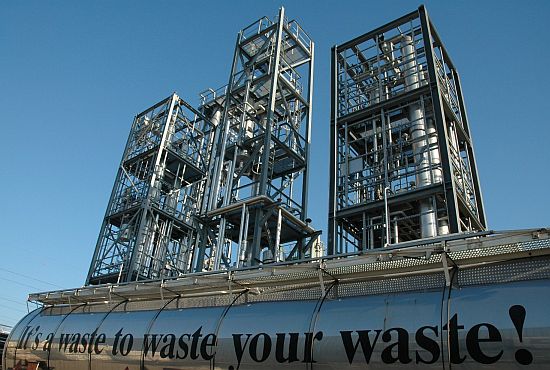De Neef Chemical Processing
A Belgian company is the pioneer in ‘Take Back Chemicals’
Recycling chemicals can drastically reduce CO2 emissions”
Paul Kriekemans, Managing Director De Neef Chemical Processing
|
Pharmaceutical companies often use large quantities of chemicals. These are expensive and not always easily available. The recycling of used substances is the perfect solution, says Paul Kriekemans at De Neef Chemical Processing: “Our customers are required to buy fewer raw materials and their CO2 emissions are reduced.”
De Neef Chemical Processing (formally known as De Neef Chemical Recycling) began recycling solvents in the seventies. They started by buying used solvents, which they purified by a process of distillation. De Neef then relaunched the recycled products on to the market. Take Back Chemicals “After a while, we faced heavy competition from others, including the cement industry, who bought used chemicals as fuel”, explains Paul Kriekemans, Strategy and Development Manager at De Neef. “We then targeted premium recycling as a way to strengthen our company. Most recycling companies recover inferior-quality products from used chemicals. We have improved our techniques to such an extent that our customers can reuse the chemicals we have purified for them in their own production process. This means that they need to buy far fewer new raw materials. Our company has become a market leader in premium recycling. This method is now being promoted throughout Europe under the name ‘Take Back Chemicals’ (TaBaChem), but we have doing it for years.” Benefits The main reason to team up with De Neef is an economic one: if companies can reuse their chemicals, then less new products need to be bought. “The ecological aspect also plays a role: less new resources are required and the company reduces its CO2 emissions”, confirms Paul Kriekemans. “The production of 1 tonne of acetone or toluene quickly creates between 1 and 3 tonnes of CO2. Recycling this same quantity releases under 300 kilos. Pharmaceutical companies who recycle their chemicals can reduce their CO2 production by between 40 and even 90 per cent.” “There are also strategic aspects to consider. The purchase price and transport of raw materials can vary enormously. By recycling important products, companies become less dependent on the market for raw materials.”
Leasing De Neef tends to enter into long-term agreements with its customers. “You can consider it a form of leasing: we are responsible for properly purifying the product and ensuring that the customer always has the right chemicals available”, says Paul Kriekemans. “By making long-term agreements, our supply of chemicals is guaranteed. Our customers can be sure to receive high-quality products for a fixed price at any time, regardless of the market fluctuations. This method can sometimes be less profitable than buying chemicals, but it is stable and sustainable.” Future In the coming years, De Neef Chemical Processing aims to go further in its purification processes. Paul Kriekemans: “We wish to purify chemicals to such an extent that they can not only be reused in the same production process, but also in other production processes. That means removing even the tiniest impurities. If a company ceases one particular production process, they can still use their chemicals in other processes. We also believe that Europe will continue increasing the standards related to the use of chemicals, which will force companies to recycle. We are currently way ahead of other Flemish and European companies and we aim to maintain this lead.” |
De Neef Chemical Processing
Sectors Chemicals ›


